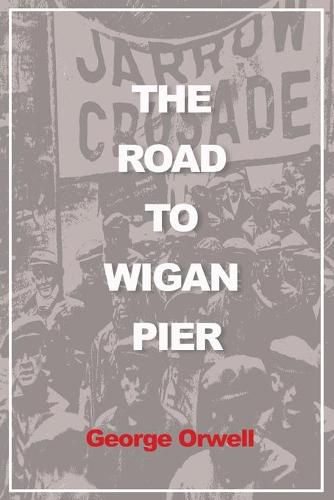Readings Newsletter
Become a Readings Member to make your shopping experience even easier.
Sign in or sign up for free!
You’re not far away from qualifying for FREE standard shipping within Australia
You’ve qualified for FREE standard shipping within Australia
The cart is loading…






This title is printed to order. This book may have been self-published. If so, we cannot guarantee the quality of the content. In the main most books will have gone through the editing process however some may not. We therefore suggest that you be aware of this before ordering this book. If in doubt check either the author or publisher’s details as we are unable to accept any returns unless they are faulty. Please contact us if you have any questions.
This is Orwell's graphic and harrowing account of working life in England's industrial North during the 1930's Great Depression. He spent two months living with the unemployed and working poor, sharing their meals, lodgings and bleak future, their horrendous working conditions and starvation-level dole. With brutal honesty, he confronts the cramped, insanitary slums, industrial accidents, eye-watering pollution, the malnourished, rickets-
prone children, and the devastating psychological and spiritual effects of unemployment. This is furiously honest investigative reporting, of a kind rarely achieved by today's politically-correct 'journalists'.
Part Two of the book looks at Socialism as a solution to working-class repression, and tries to analyse why it is rejected by most working people. Class, Orwell decides, is the central problem. Socialists who are allowed a voice in society are invariably middle-class and - despite championing the proletariat - they remain (because of their upbringing) personally averse to associating with 'the poor' - an aversion not lost upon the workers, who also find other middle-class fads ('non-smoking vegetarians') not to their taste.
The Road to Wigan Pier is uncannily relevant to today's societal problems. Orwell both points up the seemingly immutable injustice of Britain's class divisions, and gives the lie to the pernicious myth of 'white privilege'.
$9.00 standard shipping within Australia
FREE standard shipping within Australia for orders over $100.00
Express & International shipping calculated at checkout
This title is printed to order. This book may have been self-published. If so, we cannot guarantee the quality of the content. In the main most books will have gone through the editing process however some may not. We therefore suggest that you be aware of this before ordering this book. If in doubt check either the author or publisher’s details as we are unable to accept any returns unless they are faulty. Please contact us if you have any questions.
This is Orwell's graphic and harrowing account of working life in England's industrial North during the 1930's Great Depression. He spent two months living with the unemployed and working poor, sharing their meals, lodgings and bleak future, their horrendous working conditions and starvation-level dole. With brutal honesty, he confronts the cramped, insanitary slums, industrial accidents, eye-watering pollution, the malnourished, rickets-
prone children, and the devastating psychological and spiritual effects of unemployment. This is furiously honest investigative reporting, of a kind rarely achieved by today's politically-correct 'journalists'.
Part Two of the book looks at Socialism as a solution to working-class repression, and tries to analyse why it is rejected by most working people. Class, Orwell decides, is the central problem. Socialists who are allowed a voice in society are invariably middle-class and - despite championing the proletariat - they remain (because of their upbringing) personally averse to associating with 'the poor' - an aversion not lost upon the workers, who also find other middle-class fads ('non-smoking vegetarians') not to their taste.
The Road to Wigan Pier is uncannily relevant to today's societal problems. Orwell both points up the seemingly immutable injustice of Britain's class divisions, and gives the lie to the pernicious myth of 'white privilege'.